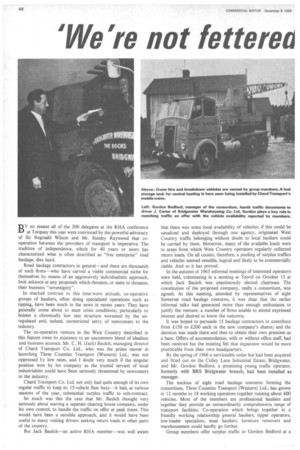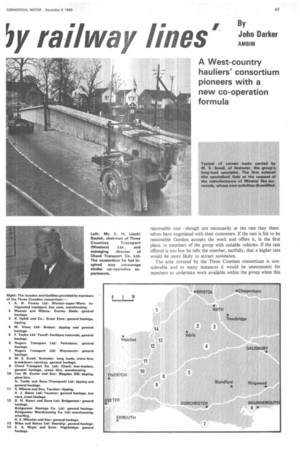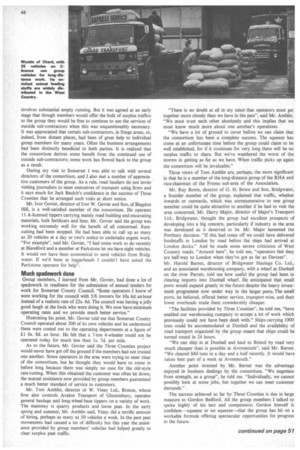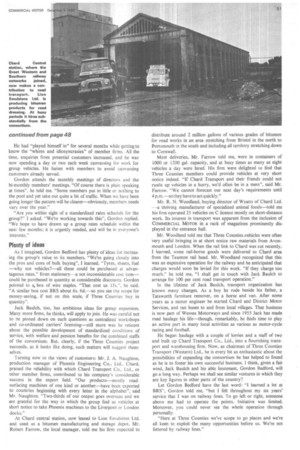'We're not fettere6 5y railway lines'
Page 48

Page 49

Page 50

Page 53

If you've noticed an error in this article please click here to report it so we can fix it.
By no means all of the 300 delegates at the RHA conference at Torquay this year were convinced by the powerful advocacy of Sir Reginald Wilson and Mr. Stanley Raymond that cooperation between the providers of transport is imperative. The tradition of independence, which for 40 years or more has characterized what is often described as "free enterprise" road haulage, dies hard.
Road haulage contractors in general—and there are thousands of such firms—who have carved a viable commercial niche for themselves by means of an aggressively individualistic approach, look askance at any proposals which threaten, or seem to threaten, their business "sovereignty".
In marked contrast to this time-worn attitude, co-operative groups of hauliers, often doing specialized operations such as tipping, have been much in the news in recent years. They have generally come about to meet crisis conditions; particularly to bolster a chronically low rate structure worsened by the unregulated and, indeed, unrestricted entry of newcomers to the industry. '
The co-operative venture in the West Country described in this feature owes its existence to an uncommon blend of idealism and business acumen. Mr. C. H. (Jack) Baukh, managing director of Chard Transport Co. Ltd., who was the prime mover in launching Three Counties Transport (Western) Ltd., was not oppressed by low rates, and I doubt very much if the singular position won by his company as the trusted servant of local industrialists could have been seriously threatened by newcomers to the industry.
Chard Transport Co. Ltd. not only had quite enough of its own regular traffic to keep its 15-vehicle fleet busy—it had, at various seasons of the year, substantial surplus traffic to sub-contract.
So much was this the case that Mr. Bau!eh thought very seriously about starting a separate clearing house company, under his own control, to handle the traffic on offer at peak times. This would have been a sensible approach, and it would have been useful to many visiting drivers seeking return loads to other parts of the country.
But Jack Baukh—an active RHA member—was well aware
that there was some local availability of vehicles; if this could be canalized and deployed through one agency, originated West Country traffic belonging without doubt to local hauliers could be carried by them. Moreover, many of the available loads were to areas from which West Country operators regularly collected return loads. On all counts, therefore, a pooling of surplus traffics and vehicles' seemed sensible, logical and likely to be commercially viable. And so it has proved.
In the autumn ol 1965 informal meetings of interested operators were held, culminating in a meeting at Yeovil on October 13 at which Jack Baulch was unanimously elected chairman. The constitution of the proposed company, really a consortium, was agreed. At this meeting, attended by representatives of eight Somerset road haulage concerns, it was clear that the earlier informal talks had generated more than enough enthusiasm to justify the venture; a number of firms unable to attend expressed interest and desired to know the outcome.
It was hoped to persuade 15 haulage contractors to contribute from £150 to £200 each in the new company's shares; and the decision was made there and then to obtain their own premises as a base. Offers of accommodation, with or without office staff, had been received but the meeting felt that expansion would be more practicable from their own headquarters.
By the spring of 1966 a serviceable cedar hut had been acquired and fitted out on the Colley Lane Industrial Estate, Bridgwater, and Mr. Gordon Bedford, a promising young traffic operator, formerly with BRS Bridgwater branch, had been installed as manager.
The nucleus of eight road haulage concerns forming the consortium, Three Counties Transport (Western) Ltd., has grown in 12 months to 18 working operators together running about 400 vehicles. Most of the members are professional hauliers and together they provide an extraordinarily comprehensive range of transport facilities. Co-operation which brings together in a friendly working relationship general hauliers, tipper operators, low-loader specialists, meat hauliers, .furniture removers and warehousemen could hardly go further.
Group members offer surplus traffic to Gordon Bedford at a involves substantial empty running. But it was agreed at an early stage that though members would offer the bulk of surplus traffics to the group they would be free to continue to use the services of outside sub-contractors when this was unquestionably necessary. It was appreciated that certain sub-contractors, in fringe areas, or, indeed, from distant places, had been of great help to individual group members for many years. Often the business arrangements had been distinctly beneficial to both parties. It is realized that the consortium derives some benefit from the continued use of outside sub-contractors; some work has flowed back to the group as a result.
During my visit to Somerset I was able to talk with several directors of the consortium, and I also met a number of appreciative customers of the group. As a rule, road hauliers do not invite visiting journalists to meet executives of transport using firms and it says much for Jack Baulch's confidence in the success of Three Counties that he arranged such visits at short notice.
Mr. Ivor Govier, director of Ivor W. Govier and Son, of Blagdon Hill, is a well-satisfied member of the consortium. He operates 11 A-licensed tippers carrying mainly road building and excavating materials, bulk fertilizers and lime. Mr. Govier said the group was working extremely well for the benefit of all concerned. Ratecutting had been stopped. He had been able to call up as many as 20 vehicles at a day or two's notice to undertake urgent work. "For example", said Mr. Govier, "I had some work to do recently at Blandford and a member at Parkstorie let me have eight vehicles. It would not have been economical to send vehicles from Bridgwater. If we'd been at loggerheads I couldn't have asked the Parkstone operator for help".
Much spadework done
Group members, I learned from Mr. Govier, had done a lot of spadework in readiness for the submission of annual tenders for work for Somerset County Council. "Some operators I know of were working for the council with 5/6 tonners for 10s. 6d. an hour instead of a realistic rate of 22s. 6d. The council was having a jolly good laugh at the fools who were doing it. We now have minimum operating rates and we provide much better service."
Illustrating his point, Mr. Govier told me that Somerset County Council operated about 200 of its own vehicles and he understood these were costed out to the operating departments at a figure of £1. Os. 8d. an hour. He felt that a 7-ton 4-wheeler could not be operated today for much less than is. 7d. per mile.
As to the future, Mr. Govier said the Three Counties project would never have got off the ground if the members had not trusted one another. Some operators in the area were trying to steer clear of the consortium, but he thought they would have to come in before long because there was simply no case for the old-style rate-cutting. When this obtained the customer was often let down; the mutual assistance now provided by group members guaranteed a much better standard of service to customers.
Mr. Tom Amblin, director of W. Viney Ltd., Bruton, whose firm also controls Avalon Transport of Glastonbury, operates general haulage and long-wheel-base tippers on a variety of work. The mainstay is quarry products and loose peat. In the early spring and summer, Mr. Amblin said, Viney did a terrific amount of hiring, perhaps as many as 50 vehicles a week. In the past peat movements had caused a lot of difficulty but this year the assistance provided by group members' vehicles had helped greatly to clear surplus peat traffic. "There is no doubt at all in my mind that operators must get together more closely than we have in the past", said Mr. Amblin. "We must trust each other absolutely and this implies that we must know much more about one another's operations.
"We have a lot of ground to cover before we can claim that the consortium has been a complete success. The squeeze has come at an unfortunate time before the group could claim to be well established, for if it continues for very long there will be no surplus traffic to share. But we've weathered the worst of the storms in getting as far as we have. When traffic picks up again the consortium will be invaluable."
These views of Tom Amblin are, perhaps, the more significant in that he is a member of the long-distance group of the RHA and vice-chairman of the Frome sub-area of the Association.
Mr. Ray Bown, director of G. H. Bown and Son, Bridgwater, a founder member of the group, explained that traffic, whether inwards or outwards, which was unremunerative to one group member could be quite attractive to another if' he had to visit the area concerned. Mr. Harry Major, director of Major's Transport Ltd., Bridgwater, thought the group had excellent prospects of developing into a big concern, particularly if industry in the area was developed as it deserved to be. Mr. Major lamented the Portbury decision. "If this had come off we could have delivered foodstuffs in London by road before the ships had arrived at London docks." And he made some severe criticisms of West Country roads. "Around here", he told me, "operators feel they are half-way to London when they've got as far as Devizes". Mr. Harold Barnet, director of Bridgwater Haulage Co.. Ltd., and an associated warehousing company, with a wharf at Dunball on the river Parrett, told me how useful the group had been in clearing imports into Dunball wharf. He anticipated that small ports would expand greatly in the future despite the heavy investment programme now under way in the larger ports. The small ports, he believed, offered better service, transport-wise, and their lower overheads made them considerably cheaper.
"The facilities provided by Three Counties", he told me, "have enabled our warehousing company to accept a lot of work which previously could not have been dealt with." Ships carrying 1000 tons could be accommodated at Dunball and the availability of road transport organized by the group meant that ships could be turned round in 24 hours.
"We can ship in at Dunball and haul to Bristol by road very much cheaper than is possible at Avonmouth", said Mr. Barnet. "We cleared 840 tons in a day and a half recently. It would have taken best part of a week at Avonmouth."
Another point stressed by Mr. Barnet was the advantage enjoyed in business dealings by the consortium. "We negotiate from strength, as a group", he told me. "Individually, we cannot possibly look at some jobs, but together we can meet customer demands."
The success achieved so far by Three Counties is due in large measure to Gordon Bedford. All the group members I talked to spoke highly of his tact and competence; Gordon himself is confident—squeeze or no squeeze—that the group has hit on a workable formula offering spectacular opportunities for progress in the future. He had "played himself in" for several months while getting to know the "whims and idiosyncrasies" of member firms. All the time, enquiries from potential customers increased, and he was now spending a day or two each week canvassing for work for group vehicles. He liaises with members to avoid canvassing customers already served.
Gordon attends the monthly meetings of directors and the bi-monthly members' meetings. "Of course there is plain speaking at times", he told me. "Some members put in little or nothing to the pool and yet take out quite a bit of traffic. When we have been going longer the pattern will be clearer—obviously, members needs vary over the year."
"Are you within sight of a standardized rates schedule for the group?" I asked. "We're working towards this", Gordon replied. "We hope to have drawn up a group rates schedule within the next few months; it is urgently needed, and will be in everyone's interests."
Plenty of ideas As I imagined, Gordon Bedford has plenty of ideas for increasing the group's value to its members. "We're going closely into the pros and cons of bulk buying", I learned. "Tyres, sheets, fuel —why not vehicles?—all these could be purchased at advantageous rates." Even stationery--a not inconsiderable cost item— could be purchased in quantity at considerable discounts. Gordon pointed to a, box of wire staples. "That cost us 15s.', he said. "A similar box cost BRS about 6s. 6d.—so you see the scope for money-saving, if not on this scale, if Three Counties buy in quantity".
Jack Baulch, too, has ambitious ideas for group expansion. Many more firms, he thinks, will apply to join. He was careful not to be pinned down on such questions as centralized workshops and co-ordinated carriers' licensing—still more was he reticent about the possible development of standardized conditions of service, with welfare and pension benefits for the combined staffs of the consortium. But, clearly, if the Three Counties project succeeds, as it looks like doing, such matters will suggest themselves.
Turning now to the views of customers: Mr. J. A. Naughton, production manager of Phoenix Engineering Co.. Ltd.. Chard, praised the reliability with which Chard Transport Co.. Ltd., or other member firms, contributed to his company's considerable success in the export field. "Our products—mostly roadsurfacing machines of one kind or another—have been exported to countries beginning with every letter in the alphabet", said Mr. Naughton. "Two-thirds of our output goes overseas and we are grateful for the way in which the group find us vehicles at short notice to take Phoenix machines to the Liverpool or London docks."
At Chard central station, now leased to Lion Emulsions Ltd. and used as a bitumen manufacturing and storage depot, Mr. Robert Farrow, the local manager, told me his firm expected to distribute around 2 million gallons of various grades of bitumen for road works in an area stretching from Bristol in the north to Portsmouth in the south and including all territory stretching down to Cornwall.
Most deliveries, Mr. Farrow told me, were in containers of 1000 or 1200 gal. capacity, and at busy times as many as eight vehicles a day were hired. His firm were delighted to find that Three Counties members could provide vehicles at very short notice indeed. "If Chard Transport and their friends could not rustle up vehicles in a hurry, we'd often be in a mess", said Mr. Farrow. "We cannot forecast our next day's requirements until 4 p.m.—so they have to act quickly."
Mr. R. N. Woodland, buying director of Wyatts of Chard Ltd.
a thriving manufacturer of specialized animal foods—told me his firm operated 25 vehicles on C licence mostly on short-distance work. Its interest in transport was apparent from the inclusion of COMMERCIAL MOTOR in a rack of magazines prominently displayed in the entrance hall.
Mr. Woodland told me that Three Counties .vehicles were often very useful bringing in at short notice raw materials from Avonmouth and London. When the rail link to Chard was cut recently, I learned, some rail-borne goods were delivered to Chard area from the Taunton rail head. Mr. Woodland recognized that this was an expensive operation for the railway and he anticipated that charges would soon be levied for this work. "If they charge too much," he told me, "I shall get in touch with Jack Baulch to arrange for 100 per cent road transport operation."
In the lifetime of Jack Baulch, transport organization has known many changes. As a boy he rode beside his father, a Tatsworth furniture remover, on a horse and van. After some years as a motor engineer he started Chard and District Motor Services, and ran buses to and from local villages. That business is now part of Wessex Motorways and since 1955 Jack has made road haulage his life—though, remarkably, he finds time to play an active part in many local activities as various as motor-cycle racing and football.
He began haulage with a couple of lorries and a staff of two and built up Chard Transport Co., Ltd., into a flourishing transport and warehousing firm. Now, as chairman of Three Counties Transport (Western) Ltd., he is every bit as enthusiastic about the possibilities of expanding the consortium he has helped to found as he is to foster his own successful business. I think, given a fair wind, Jack Baulch and his able lieutenant, Gordon Bedford, will go a long way. Perhaps we shall see similar ventures in which they are key figures in other parts of the country?
Let Gordon Bedford have the last word: "I learned a lot at BRS", Gordon told me, "but I felt throughout my six years' service that I was on railway lines. To go left or right, someone above me had to operate the points. Initiative was limited. Moreover, you could never see the whole operation through personally.
"Here at Three Counties we've scope to go places and we're all keen to exploit the many opportunities before us. We're not fettered by railway lines."












































































































